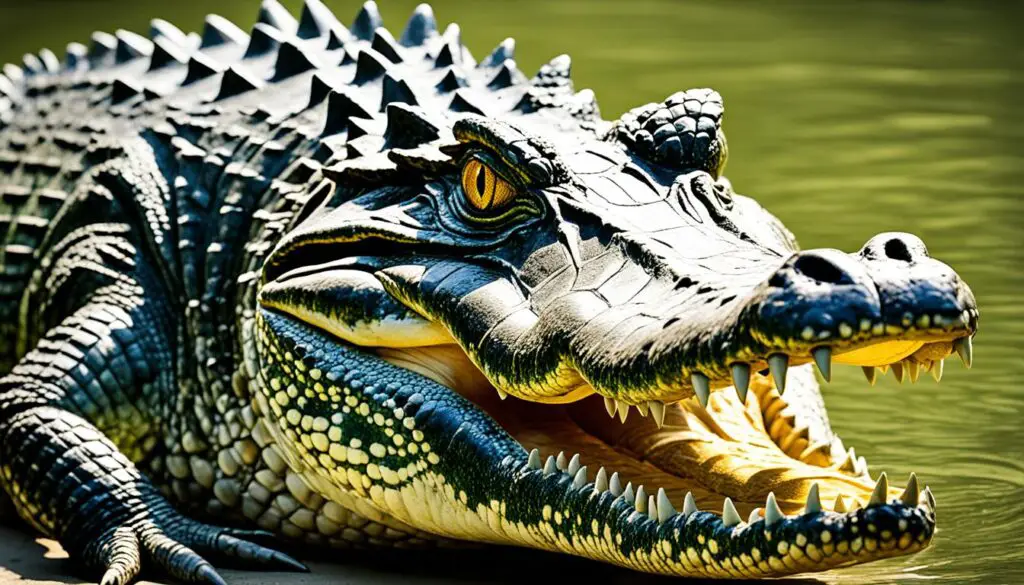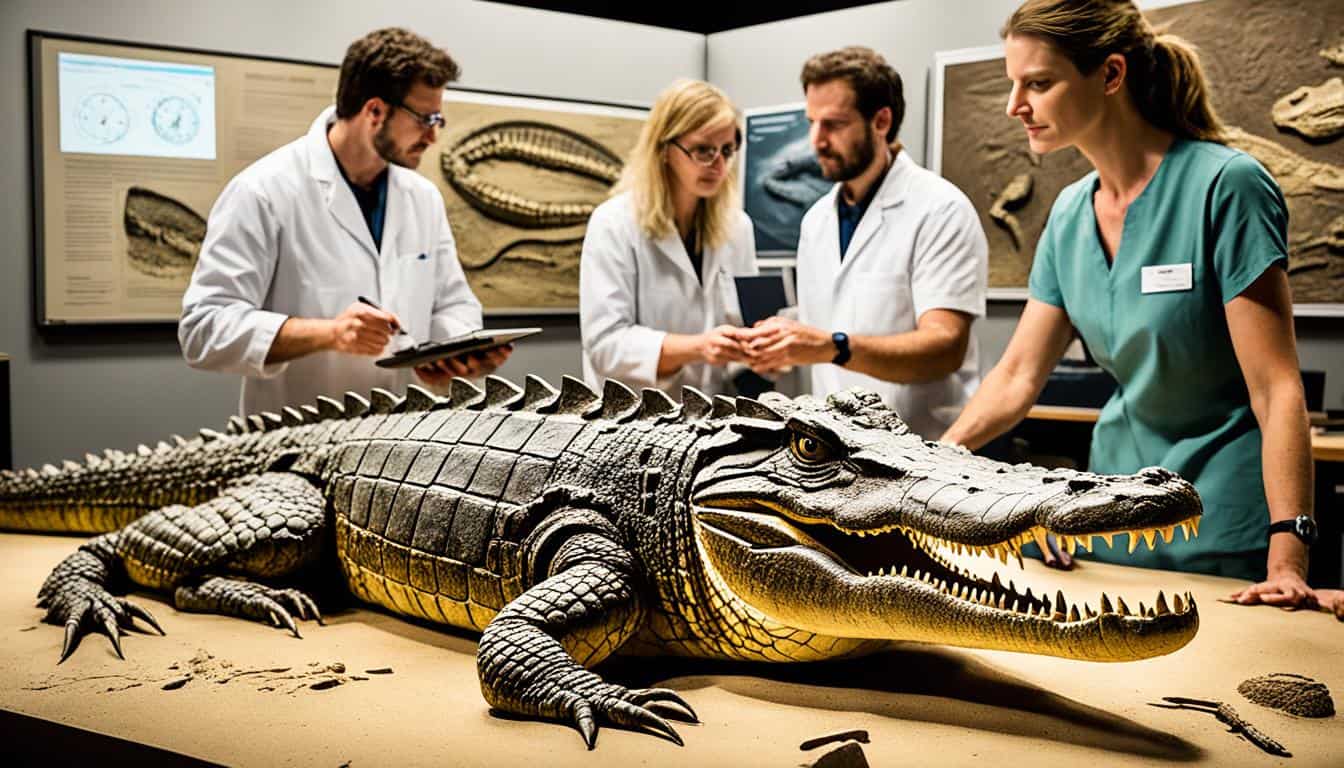Ever thought about how old the oldest crocodile is? Let’s dive into the tale of Mr. Freshie, a crocodile that reached an amazing 140 years old before he died in 2010. By looking into these records, we learn a lot about how long these ancient reptiles can live. This piece will show you the longest-lived crocodile and what makes them so long-lived.
Exploring Crocodile Longevity
Crocodiles are known for their long lives, often living over a century in different places. Their long lives help us understand what makes them so resilient. Things like their environment and biology play a big role in how long they live.
The Lifespan of Crocodiles in the Wild
Many types of crocodiles live a long time in the wild. They can live over 100 years, depending on the species. These reptiles do well in places with plenty of food and few dangers.
Their ability to adapt helps them live a long time in the wild. This means they can survive and thrive in their natural habitats.
Factors Influencing Crocodile Longevity
Several things affect how long crocodiles live in their homes:
- Habitat: Crocodiles do best in places with lots of resources. They need wetlands, rivers, and lakes for shelter and food.
- Diet: Eating the right foods helps them stay healthy, which means they can live longer.
- Predation Risks: If they have fewer predators, crocodiles can live and grow without being threatened.
Comparison with Other Reptiles
When we look at other reptiles, we see some big differences. Tortoises often live longer than crocodiles, but crocodiles still have impressive lifespans. They grow and age in ways that are different from many other reptiles.
This makes them interesting to study and learn from. It gives us a deeper look into the lives of reptiles.
| Species | Average Lifespan | Maximum Recorded Age |
|---|---|---|
| American Crocodile | 50-70 years | 100+ years |
| Saltwater Crocodile | 70-100 years | 110 years |
| Nile Crocodile | 70-90 years | 100 years |
| Orinoco Crocodile | 30-60 years | 70 years |
How Old Is the Oldest Known Crocodile?
Exploring the oldest crocodile age reveals amazing stories of their long lives. Mr. Freshie is a legend, living 140 years in captivity. He shows us the incredible potential of these ancient reptiles.
Meet Mr. Freshie: The Record Holder
Mr. Freshie, a freshwater crocodile, amazes people with his long life. He was found in the Moorehead River and moved to Australia Zoo. There, he got top-notch care that helped him live so long.
His life shows how well crocodiles can live with good care. He reached ages rarely seen in the wild.
Other Notable Long-Lived Crocodiles
Mr. Freshie is the oldest crocodile known, but others have lived long too. For example:
- Henry: Reached an impressive 122 years.
- Cassius: Surpassed 114 years in captivity.
These stories show how long crocodiles can live. They make us wonder about their lives and the need to protect them and their homes.
Crocodile Age Records Throughout History
For millions of years, we’ve studied the age of crocodiles. Fossils tell us a lot about these ancient reptiles. They show us how they grew and aged, helping us understand how long they lived.
Stories from different cultures add to our knowledge. They mix science with tales, giving us a full picture of crocodiles.
Fossil Evidence and Its Insights
Crocodile fossils are found all over the world. They give scientists important clues. These fossils show us the size and shape of ancient crocodiles.
They also tell us how these creatures changed over time. By looking at the age of these fossils, scientists learn about their lives. They figure out how long they lived, how they had babies, and how they survived.
Historical Perspectives on Crocodile Age
Many cultures have written about crocodiles. They talk about their big size and long lives. Some stories even say crocodiles lived as long as we think today.
This mix of stories and facts helps us understand crocodiles better. It shows how these creatures have amazed people for a long time.
The Science of Determining Crocodile Age
Figuring out how old a crocodile is is a complex task. Scientists use many methods used for age estimation to learn about these amazing reptiles. These methods help us understand their life cycles and how they fit into their environments.
Methods Used for Age Estimation
One common way is to count the rings on the scutes, the hard plates on a crocodile’s back. Each ring usually means one year of growth. But, things like the environment can change this count. Other experts look at how fast they grow based on what they eat and where they live.
Now, scientists are using radiocarbon dating on bones for a more precise age check.
Challenges in Accurate Age Assessment
Even with these methods used for age estimation, finding out how old crocodiles are isn’t easy. Crocodiles in the wild and those in captivity grow at different rates, making it hard to guess their age. Their growth can vary a lot from one to another. Also, getting samples for study is tricky because of ethical issues and laws protecting many species.
Crocodile Conservation and Age Discovery
Understanding how to protect crocodiles is key to their survival. Knowing how old they can live helps us see how healthy their populations are. This info is crucial for saving their homes.
Studies on crocodile ages help us track how diverse their ecosystems are. This guides us in keeping the environment balanced. Crocodile age records are like a map for protecting nature.
Research on crocodile ages leads to better breeding programs. These programs keep the species’ genes diverse, which is good for their health. Seeing the value of age studies shows us how they help protect ancient reptiles.
Learning about the link between crocodile age and conservation gives us a deeper look at nature. Each crocodile is important in its world. So, we must use age research to guide conservation efforts.
| Aspect | Description |
|---|---|
| Crocodile Age Records | Data reflecting the longevity and age range of various crocodile species |
| Crocodile Conservation Efforts | Initiatives aimed at preserving crocodile populations and their habitats |
| Impact of Aging Populations | Insights into ecosystem health through monitoring crocodile ages |
| Breeding Programs | Efforts to maintain genetic diversity and population viability |
Conclusion: The Importance of Crocodile Longevity in Ecosystem Health
Crocodiles live a long time, which is more than just interesting. They play a key role in keeping ecosystems healthy. Their long lives help balance the water habitats by controlling the food chain and keeping species diversity.
Learning about how long crocodiles live helps us understand why we need to protect them. When crocodiles are healthy and old, it means the ecosystem is doing well. By studying their long lives, we see how different species are connected and why it’s important to keep them safe.
This knowledge helps us value these amazing animals more. It teaches us about the importance of taking care of our planet for the future.

Further Reading and Resources on Crocodile Longevity
If you’re eager to learn more about crocodile longevity, there are many resources available. Journals like the Journal of Herpetology and the Journal of Applied Ecology publish new research. This research covers crocodile age records and their role in conservation.
These articles share how scientists estimate crocodile ages and link age to health and environment. They also discuss how these factors change over time.
Books are another great way to explore crocodile longevity. “Crocodiles: An Action Plan for Their Conservation” gives a historical look at conservation efforts. It also shares stories of individual crocodiles and their long lives.
Documentaries, such as “Crocodile Hunter,” entertain and teach about reptiles. They show the complex lives of crocodiles and their habitats.
Online platforms are full of information on crocodiles too. Sites from groups like the World Wildlife Fund have detailed info on crocodile ages and conservation. Using these resources can deepen your knowledge and support education efforts.
FAQ
How old is the oldest known crocodile?
Mr. Freshie, the oldest crocodile, was 140 years old when he died in 2010. This shows how long crocodiles can live, especially in captivity.
What factors influence crocodile longevity?
Crocodile longevity depends on their habitat, diet, and the danger of being preyed upon. In the wild, they can live over a century. In zoos, with better care, they may live even longer.
Are there any notable long-lived crocodiles apart from Mr. Freshie?
Yes, Henry lived for 122 years, and Cassius is over 114 years old. These examples show how long crocodiles can live with the right care.
How do scientists determine a crocodile’s age?
Scientists use methods like counting scute rings and analyzing growth rates. These methods consider environmental factors and diet. But, they can be tricky due to the unique biology of each crocodile and limited access to specimens.
What impact does understanding crocodile age have on conservation efforts?
Knowing how long crocodiles live is key for conservation. It shows the health of ecosystems. This knowledge helps protect habitats and supports breeding programs. It’s important for keeping these ancient reptiles safe in the wild.







